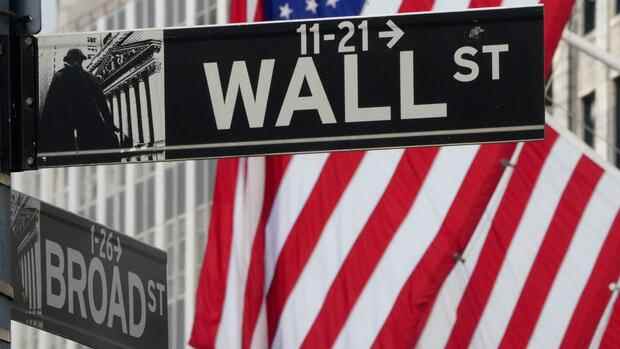The US markets have had a turbulent week.
(Photo: AP)
new York Russia’s attack on Ukraine has rocked stock markets around the world. There was also initial selling pressure on the US stock exchanges. However, Wall Street closed higher after the US government announced new sanctions against Russia. In the commodities sector, stockbrokers expect a massive supply shortage due to sanctions against oil and natural gas suppliers Russia, which drove up prices. The price of oil rose above $100 per barrel for the first time since 2014, fueling fears of a new surge in inflation. “As unpredictable as the political escalation and situation is, the conceivable global economic effects are now tangible,” said Thomas Böckelmann from the Euroswitch asset management team.
The Dow Jones index gained 0.3 percent to 33,223 points after falling almost 1,000 points in early trading. A similar picture emerged at the tech-heavy Nasdaq. It closed 3.3 percent higher at 13,473 points after initially being down around three percent. The broad S&P 500 rose 1.5 percent to 4,288 spots.
US President Joe Biden has sharply criticized Russian President Vladimir Putin and announced another package of sanctions against Russia. Peter Cardillo, chief economist at investment firm Spartan, said the tough stance by the US and Europe was a loud message to financial markets that they wanted to hit Russia’s economy as hard as possible.
On the oil market, the price of Brent crude oil from the North Sea increased by up to 9.2 percent and marked a seven and a half year high at $105.79 per barrel (159 liters). In late trade, the price melted to $99.02. The European natural gas future jumped by up to 42 percent to 120 euros per megawatt hour.
Top jobs of the day
Find the best jobs now and
be notified by email.
Strategists expect further high fluctuations on the world stock exchanges. “I don’t think many investors have had to grapple with the combination of rising inflation, which was last really seen in the early 1980s, and a major military operation in Europe, which in turn was last seen in World War II,” said Neil Wilson , Chief Markets Analyst at Markets.com. “It’s a loss of confidence. This is kind of new territory for a lot of people.”
After Russia attacked Ukraine from several directions, the West already reacted with further heavy sanctions. “The Russian invasion of Ukraine is a serious geopolitical crisis with far-reaching implications,” said Bank Berenberg analyst Kallum Pickering. DZ Bank reduced its price targets for various international indices. The experts now expect the S&P 500 to be at 4800 points at the end of 2022 instead of the previous 5300 points.
Look at other individual values
Technology values: Many technology stocks rebounded vigorously from their early losses. Such were the papers of Microsoft, Intel and Salesforce with price gains between 4.6 and 7.2 percent, the biggest Dow winners. The tech industry is considered to be relatively dependent on low interest rates, so investors speculated that the central banks could reconsider their monetary policy leeway because of the Ukraine conflict so as not to further weaken the economy.
financial sector: Conversely, the financial sector was affected by the aggravated situation. In addition to general concerns about the consequences of tensions and sanctions, industry stocks suffered from interest rate speculation in a very different way to tech stocks. This resulted in the shares of JPMorgan were among the biggest Dow losers at a discount of 2.8 percent. Up until a few days ago, financial stocks were still in high demand because of the prospect that interest rates would soon rise.
eBay: On the Nasdaq stock exchange, Ebay’s stocks attracted attention by converting an initially significant slide in prices, which came about because of a disappointing sales outlook, into profits. In the end, the titles of the online trading place crossed the finish line with an increase of 1.6 percent.
Tesla: Tesla shares also turned up a lot: after falling to exactly the $700 mark, which was the lowest level since August, the electric car manufacturer’s shares ended up rising by 4.8 percent.
Booking: However, the 7.1 percent weaker shares of the travel booking provider Booking Holding remained under heavy pressure on the Nasdaq, which collapsed by almost ten percent according to its figures. Expert Mario Lu from the British bank Barclays pointed to a disappointing margin outlook.
Moderna: Things looked better at Moderna, with the vaccine manufacturer’s papers soaring by 15 percent. The biotech company continues to make excellent money from its corona vaccine, as the most recent interim report showed. In addition, the Biontech rival raised this year’s sales forecast for its corona vaccine slightly. The Biontech shares increased by nine percent.
Alibaba: Alibaba’s shares fell almost 1 percent. The Chinese tech giant posted its weakest growth since going public in 2014 in the past quarter.
More: How investors can rely on the nutrition megatrend
